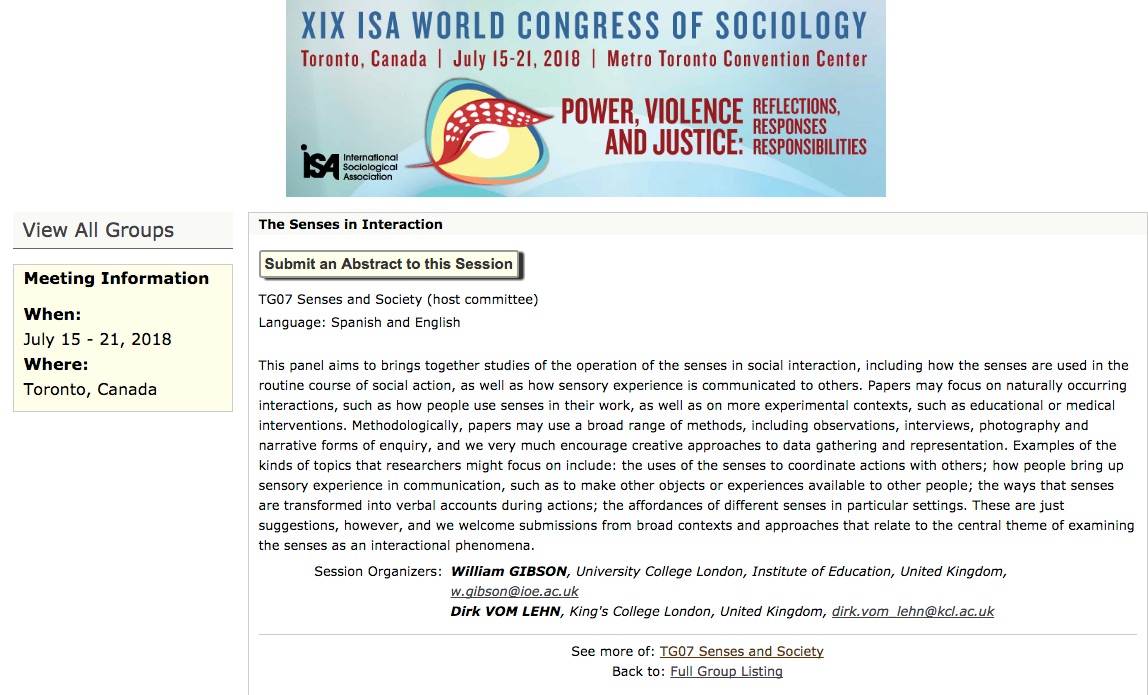Sensing Life: the social organization of the senses in interaction
Co-edited by
Will Gibson (University College London), Natalia Ruiz-Junco (Auburn University), and Dirk vom Lehn (King’s College London)
This edited collection aims to continue the advances in scholarship of the senses as interactional phenomena and experiences. Our aim is to bring together contemporary empirical research that looks at how the senses are used in interaction, showcasing the broad range of concepts and methodologies through which they can be examined.
In the past decade or so interactionist researchers have been increasingly interested in the role of the senses in social interaction (see e.g., Vannini, Waskul and Gottschalk 2012). A special issue of the journal Symbolic Interaction in 2021 brought together studies that examined sensorial practice, focusing on diverse areas including everyday acts such as cheese and coffee tasting (Mondada, 2021; Fele and Liberman, 2021) through to the professional work of nurses (Grosjean, Matte, and Nahon-Serfaty, 2021) and race car testers (Salvadori and Gobo). These collected papers marked an important development in the empirical examination of communication about the senses, showing how talk, gesture, gaze, material artefacts and other aspects of the physical environment can be mobilised to make the senses accountable to others. The introduction to this special issue (vom Lehn and Gibson, 2021) pointed to several interrelated features of sensorial praxis which the papers helped to bring into focus. The intersection between different sensorial experiences; the entwinement of the senses with cultural resources and practices; their contextually situated nature and the multimodal, structured but also serendipitous form of expression.
The proposed volume aims to continue these lines of analysis by inviting contributions from a multiplicity of approaches, including symbolic interactionism, ethnomethodology, Conversation Analysis, and cognate areas from Discourse Studies and multimodal inquiry. To balance the strong EMCA theme represented in the 2021 special issue we are particularly keen to encourage papers from symbolic interactionism or that use ethnographic methods. We are interested in papers that examine conceptually and empirically the uses of the senses in ‘making something happen’, which might be in an institutional or non-institutional context.
We welcome tentative expressions of interest and are happy to explore the fit of possible research papers with the above theme.
An abstract of no more than 400 words should be submitted by email to Will Gibson, Natalia Ruiz-Junco, and Dirk vom Lehn (SensesInteractionism@gmail.com). Although the deadline has passed on 2 May 2023 we are still accepting abstract submissions.
Bibliography
Fele, Giolo, and Kenneth Liberman. 2021. ‘Some Discovered Practices of Lay Coffee Drinkers’. Symbolic Interaction 44, no. 1: 40–62. https://doi.org/10.1002/symb.486.
Gibson, Will, and Dirk vom Lehn. 2021. ‘Introduction: The Senses in Social Interaction’. Symbolic Interaction 44, no. 1: 3-9.
Grosjean, Sylvie, Frederik Matte, and Isaac Nahon-Serfaty. 2021. ‘“Sensory Ordering” in Nurses’ Clinical Decision-Making: Making Visible Senses, Sensing, and “Sensory Work” in the Hospital’. Symbolic Interaction 44, no. 1: 163–182. https://doi.org/10.1002/symb.490.
Mondada, Lorenza. 2021. ‘Orchestrating Multi-Sensoriality in Tasting Sessions: Sensing Bodies, Normativity, and Language’. Symbolic Interaction 44, no. 1: 63–86.
Vannini, Philip, Dennis D. Waskul, and Simon Gottschalk. 2012. The Senses in Self, Society, and Culture. London: Routledge.
Salvadori, Francesca Astrid, and Giampietro Gobo. 2021. ‘Sensing the Bike: Creating a Collaborative Understanding of a Multi-Sensorial Experience in MotoGP Racing’. Symbolic Interaction 44, no. 1: 112–133. https://doi.org/10.1002/symb.529.
Wiggins, Sally, and Leelo Keevallik. 2021. ‘Enacting Gustatory Pleasure on Behalf of Another: The Multimodal Coordination of Infant Tasting Practices’. Symbolic Interaction 44, no. 1: 87–111. https://doi.org/10.1002/symb.527.

